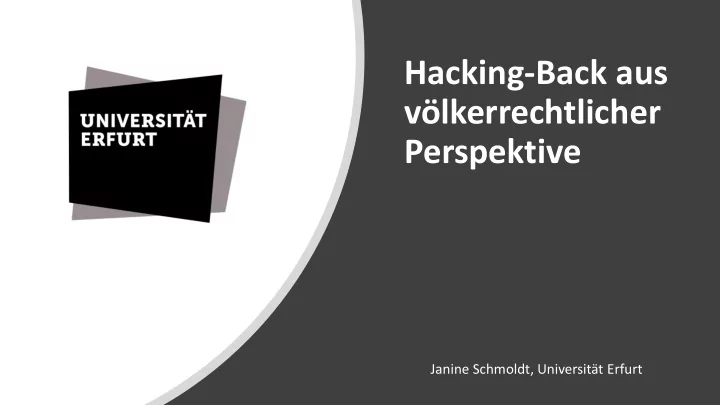

Hacking-Back aus völkerrechtlicher Perspektive Janine Schmoldt, Universität Erfurt
Charta der Vereinten Nationen Artikel 2 (4) „ Alle Mitglieder unterlassen in ihren internationalen Beziehungen jede gegen die territoriale Unversehrtheit oder die politische Unabhängigkeit eines Staates gerichtete oder sonst mit den Zielen der Vereinten Nationen unvereinbare Androhung oder Anwendung von Gewalt. “
Martens’sche Klausel „In Fällen, die von den geschriebenen Regeln des internationalen Rechts nicht erfasst sind, verbleiben Zivilpersonen und Kombattanten unter dem Schutz und der Herrschaft der Grundsätze des Völkerrechts, wie sie sich aus den feststehenden Gebräuchen, aus den Grundsätzen der Menschlichkeit und aus den Forderungen des öffentlichen Gewissens ergeben.“
International Court of Justice “the entire law (…) applies to all forms of warfare and to all kinds of weapons, those of the past, those of the present and those of the future.” International Court of Justice, the Legality of the threat or use of Nuclear Weapons, Advisory Opinion, 8 July 1996, paras. 74-87
Artikel 36, Zusatzprotokoll I „Jede Hohe Vertragspartei ist verpflichtet, bei der Prüfung, Entwicklung, Beschaffung oder Einführung neuer Waffen oder neuer Mittel oder Methoden der Kriegführung festzustellen, ob ihre Verwendung stets oder unter bestimmten Umständen durch dieses Protokoll oder durch eine andere auf die Hohe Vertragspartei anwendbare Regel des Völkerrechts verboten wäre“
International Court of Justice Legality of the threat or use of Nuclear Weapons (Advisory Opinion) “In this respect, it seems significant that the thesis that the rules of humanitarian law do not apply to the new weaponry, because of the newness of the latter, has not been advocated in the present proceedings.” International Court of Justice, the Legality of the threat or use of Nuclear Weapons, Advisory Opinion, 8 July 1996, paras. 74-87
According to Michael N. Schmitt there is no reason “to distinguish nuclear from computer weapons, at least on the basis of when they were developed vis-à-vis the entry into force of relevant humanitarian law norms, the same conclusion applies to CNA .” Michael N. Schmitt, Wired warfare: Computer network attack and jus in bello, S. 370
Souveränität Bild Quelle: https://bit.ly/31hKzZu
Island of Palmas Case Permanent Court of Arbitration „ Sovereignty in the relations between States signifies independence. Independence in regard to a portion of the globe is the right to exercise therein, to the exclusion of any other State, the functions of a State” Priciple of Sovereignty
Violation of Sovereignty Territory Inherently Governmental Functions
UK Position on International Law Attorney General Jeremy Wright „ Sovereignty is of course fundamental to the international rules-based system. But I am not persuaded that we can currently extrapolate from that general principle a specific rule or additional prohibition for cyber activity beyond that of a prohibited intervention. The UK Government’s position is therefore that there is no such rule as a matter of current international law” Cyber and International Law in the 21st Century
Lotus Case The Permanent Court of International Justice „ Now the first and foremost restriction imposed by international law upon a State is that-failing the existence of a permissive rule to the contrary-it may not exercise its power in any form in the territory of another State ”
Corfu Chanel International Court of Justice „ But to ensure respect for international law, of which it is the organ, the Court must declare that the action of the British Navy costituted a violation of Albanian sovereignty”
Nicaragua Case International Court of Justice „ The effects of the principle of respect for territorial sovereignty inevitably overlap with those of the principles of the prohibition of the use of force and of non- intervention” “The Court has in fact found that these operations were carried on in Nicaragua's territorial or internal waters or both (paragraph 80). and accordingly they constitute a violation of Nicaragua's sovereignty” Judicial Treatment
Responsibility of States for Internationally Wrongful Acts Artikel 52 Voraussetzungen bezüglich der Anwendung von Gegenmaßnahmen Der benachteiligte Staat kann „solche dringenden Gegenmaßnahmen ergreifen, die zur Sicherung seiner Rechte notwendig sind“
Responsibility of States for Internationally Wrongful Acts Artikel 50 Verpflichtungen, die von Gegenmaßnahmen nicht beeinflusst werden: 1. Gegenmaßnahmen beeinflussen nicht: a) die Verpflichtung zur Unterlassung der Androhung oder Anwendung von Gewalt, wie sie in der Charta der Vereinen Nationen niedergelegt ist; b) Verpflichtungen zum Schutz der fundamentalen Menschenrechte; c) Verpflichtungen humanitärer Art, die Repressalien verbieten; d) andere Verpflichtungen aus zwingenden Normen des allgemeinen Völkerrechts
Responsibility of States for Internationally Wrongful Acts Artikel 8 Von einem Staat geleitetes oder kontrolliertes Verhalten Das Verhalten einer Person oder Personengruppe wird nach dem Völkerrecht als Handeln eines Staates betrachtet, wenn die Person oder Personengruppe in der Ausführung des Verhaltens tatsächlich auf Anweisung oder unter der Leitung oder Kontrolle dieses Staates handelt.
“The attack was my own initiative – I received no help either from Nashi or from Russian officials” Konstantin Goloskokov Lowe, C. (2009) “Kremlin loyalist says launched Estonia cyber - attack”, [online], Reuters article, https://www.reuters.com/article/us-russia-estonia-cyberspace/kremlin-loyalist-says-launched-estonia-cyber- attackidUSTRE52B4D820090313.
Vielen Dank für Ihre Aufmerksamkeit Janine Schmoldt, Universität Erfurt
Recommend
More recommend